On Dec. 3, South Korean president Yoon Suk Yeol declared martial law, lasting for a total of six hours before it was blocked by legislators. President Yoon reasoned that it was needed due to North Korean forces that were threatening the country. However, it is suspected that President Yoon declared martial law to crush his political enemies.
Martial law is when the military is given complete power and citizens may have their liberties suspended as the military can do whatever they want for an indefinite period of time.
This incident sparked concerns regarding the fragility of democracy after witnessing such a well-established democracy experience its leader make dictatorship-like decisions
There has been a history of martial law in South Korea. Under the military regimes of the 1900s, South Korea’s leaders abused martial law in order to crush those who were pro-democracy, the most noticeable being during the Gwangju Uprising of 1980.
The Gwangju Uprising of 1980 occurred when South Korea still had a military government. Students were protesting against the government and in support of democracy, so the government implemented martial law. The government opened fire on the civilians in a massacre, killing hundreds. This horror led to more demands for political change.
“As someone born and brought up in a democracy like the United States, it is quite shocking how a government can take away rights when it feels threatened,” stated senior Ameya Menon. Democracies across the world have diverse origins and function in different ways relative to the United States. Each government has different safeguards or laws regarding government accountability and the abuse of power.
“Living in a democracy that has been established for so many years, it can be easy to think it will remain that way forever,” stated senior Himanshu Jangid. South Korea has been regarded as a well-established democracy in Asia. Despite its strong international tourist base, with the martial law situation, visitors have been scared off due to the lack of safety and stability
“In a democracy, I believe the government should stay accountable and there should be measures kept in place to ensure that,” continued Jangid. South Korea did have laws in place to ensure that the government stayed accountable, as within hours, lawmakers revoked President Yoon’s decision.
This incident serves as a critical reminder for young adults to engage in politics, exercise their rights, safeguard democratic values and instate a government that will make sure to uphold those values and not cross the line that President Yoon did.









